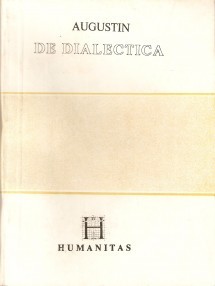- Bible
- Read the Bible
- Bible Versions
- Verse of the Day
- Reading Plans
- Verses by Topic
- Books of the Bible
- Bible Images
- Study
- Commentaries
- Concordances
- Dictionaries
- Encyclopedias
- Sermons
- Bible Atlas & Maps
- BP Wiki
- Devotionals
- Today's Devotionals
- Light of the World
- All Devotionals
- Inspirational Quotes
- More
- Picture Quotes
- Videos
- Inspirational
- Bible Study
- What The Bible Says
- Bible Q&As
- Daily Bread
- Bible by Genre
- Bible Stories
- Random Bible Verse
- Community
- Store
De dialectica
by Augustine
Pastrat in cinci manuscris sub titlul De Dialectica sau Principia dialectica, acest opuscul al lui Augustin a fost editat mai intii la Basel, in 1558, sub numele lui Chirius Fortunatianus. Actuala editie, reproducind editia Humanitas din 1991, pune la dispozitia publicului romanesc unul din textele cele mai citite si mai intens studiate din Evul Mediu latin. Abordind reflectia filozofica din perspectiva limbajului, Augustin ajunge sa transforme dialectica stoico-aristotelica intr-o adevarata teorie semiologica. Cunoasterea nemijlocita a textelor grecesti explica de ce Augustin a fost considerat drept cel mai mare semiotician al Antichitatii, un adevarat intemeietor al acestei directii de cercetare. Prin raportare la doctrina augustiniana, teoriile saussuriene pot aparea astazi adevarate supravietuiri.
BUY NOW
Paperback, Colectia Phi, 240 pages
Published 1991 by Editura Humanitas (first published March 31st 1975)
tags: philosophy
© 2025 Bibleportal.com All rights reserved.

Aurelius Augustinus - more commonly "St. Augustine of Hippo," or simply "Augustine" - was a philosopher and theologian, and one of the most important figures in the development of Western Christianity. He framed the concepts of original sin and just war. Augustine was one of the most prolific Latin authors in terms of surviving works, and the list of his works consists of more than a hundred separate titles.
Augustine took the view that the Biblical text should not be interpreted literally if it contradicts what we know from science and our God-given reason. Many Protestants, especially Calvinists, consider him to be one of the theological fathers of Reformation teaching on salvation and divine grace.
... Show more